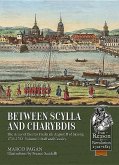A detailed exploration of Prussian fortifications under Frederick the Great, examining their construction, theory, and strategic significance. The King and His Fortresses describes Prussian fortifications during the reign of Frederick the Great - the historical background, the experience of attacking the fortresses captured by the Prussian king, and the theory of fortification. At the book's core are two extensive chapters describing the fortresses built and modernized by the Prussians in two periods - 1740-1756 and 1763-1786, separated by the Seven Years War. The King and His Fortresses provides a comprehensive overview of Prussian fortifications during the reign of Frederick the Great. The first three chapters briefly describe the Prussian state, European fortification in the late seventeenth and early eighteenth centuries, and the state of Prussian fortifications when Frederick the Great took power. Chapter four details Frederick the Great's experience in fortress warfare, including his education in the field, the fortress exercises he conducted during peacetime, and the sieges he led or observed. Chapter five covers Prussian fortification theory during the Frederician period, including both the king's own ideas and the texts written by his engineers. The heart of the book lies in chapters six and seven, which describe the fortresses built and modernized by Frederick the Great. Chapter six covers the design and construction of fortresses between 1740 and 1756, including detailed information about fortresses in Silesia, Glogau, Neisse, Glatz, Cosel, Schurgast, Brieg, Schweidnitz, and Breslau. Additionally, the chapter describes the different types of fortress used in Prussian fortification during this time, including the use of advanced works and forts and the subject of caponiers. Chapter seven covers the years between 1763 and 1786, detailing the construction of fortresses on the Oder and in the mountains of Silesia and other provinces of the Prussian state. New solutions used in fortresses are discussed separately; artillery casemates are extensively described, including specific Prussian solutions in the form of casemates with arcaded walls open from behind and so-called Hangars - free-standing casemates serving as shelters for guns firing from open positions. The final chapter provides a collective overview of various aspects of the design and construction of Prussian fortresses during the Prussian period, including the most influential designers, the organisation of construction, workers, contractors, and issues related to financing the construction of fortresses and controlling expenditure.
Hinweis: Dieser Artikel kann nur an eine deutsche Lieferadresse ausgeliefert werden.
Hinweis: Dieser Artikel kann nur an eine deutsche Lieferadresse ausgeliefert werden.







